#WareHouseManagementSystem
Explore tagged Tumblr posts
Text
#inventorysoftwareforwarehouse#WarehouseInventoryManagementSoftware#warehousemanagement#warehousemanagementsystem#warehousestockmanagementsystem
2 notes
·
View notes
Text
Why Invest in a Warehouse Management System Today
Managing a warehouse in today’s fast-moving market isn’t easy. With increasing customer expectations and supply chain complexities, using manual processes or outdated systems is risky.
To stay competitive and profitable, businesses must adopt a robust Warehouse Management System (WMS).

What is a Warehouse Management System?
A Warehouse Management System is a software solution that helps manage and optimize warehouse operations like inventory control, stock tracking, picking, packing, and shipping. It's a powerful tool designed to enhance visibility, accuracy, and productivity in your supply chain.
A good Warehouse System works alongside tools such as shop stock management software, sales inventory software, and software for inventory and sales to offer end-to-end control.
Top Reasons to Invest in an Inventory Management System Today
1. Accurate Inventory Tracking
Manual inventory tracking lead to human errors and mismatches. A Warehouse Management System offers:
Real-time stock visibility
Barcode and RFID integration
Reduced shrinkage and stockouts
Smooth syncing with shop inventory management tools
2. Faster and Reliable Order Fulfillment
Fulfilling customer orders quickly and accurately improves brand loyalty. Stock Management System allows:
Intelligent pick-pack-ship automation
Instant stock updates
Integration with store stock software
Seamless returns management
3. Cost Savings Across the Supply Chain
With automation and analytics, a Warehouse Management System reduces operational overheads:
Fewer manual errors and returns
Optimized labor and space usage
Works with billing and inventory management software for financial accuracy
4. Scalability for Future Growth
As your operations expand, a flexible Inventory Management System supports:
Multi-location warehouses
Cloud access and remote monitoring
Compatibility with shop management software and POS tools
5. Smarter Decisions with Data Insights
An Inventory Management System tracks all warehouse activities and provides key performance indicators:
Real-time dashboards
Inventory turnover reports
Trends to integrate with software for shop inventory systems
Core Features of a Stock Management Software You Should Look For
When choosing a Warehouse Management System, ensure it supports integration with your business software ecosystem:
Shop inventory management software
Software for inventory and sales
Store management software
Billing and inventory management software
Sales inventory software
These features not only enhance functionality but ensure the system grows with your business needs.
Which Businesses Should Use Warehouse Management Software
From small retail shops to large warehouses, anyone handling inventory benefits from Warehouse Management System the Warehouses include:
Retailers using shop stock management software
Grocery stores using shop inventory management tools
E-commerce brands needing software for inventory and sales
Wholesalers tracking bulk stock with store stock software
Why You Shouldn’t Delay
Every day without a proper Warehouse Management System is a missed opportunity to optimize operations. Failing to modernize leads to:
Inventory mismanagement
Higher costs
Delayed orders
Disconnected software systems (like POS and shop inventory management software)
By investing in WMS today, you position your business for:
Faster delivery
Greater accuracy
Long-term growth
Conclusion
In today’s digital-first world, a Warehouse Management System is no longer optional. Whether you run a retail store, eCommerce business, or wholesale unit.
Integrating your warehouse with systems like shop management software, store management software, and billing and inventory management software will drive better results.
#WarehouseManagementSystem#InventoryManagement#ShopInventorySoftware#StoreManagementSoftware#RetailTech#InventorySolutions#BillingAndInventorySoftware#WarehouseAutomation#SalesInventorySoftware#RetailSoftware#SupplyChainSolutions#InventoryTracking#BusinessSoftware#InventoryOptimization#StockManagement
0 notes
Text
Efficient Warehousing Solutions in India – Storage & Logistics Made Simple
Discover reliable warehousing solutions in India with secure storage, inventory management, and logistics support. Optimize your supply chain with smart warehouse services tailored for businesses.
Warehousing solutions in India are rapidly transforming to meet the demands of a growing economy, e-commerce boom, and global supply chain integration. As companies expand their operations across the country, efficient warehousing services play a critical role in ensuring timely delivery, inventory accuracy, and cost-effective logistics.
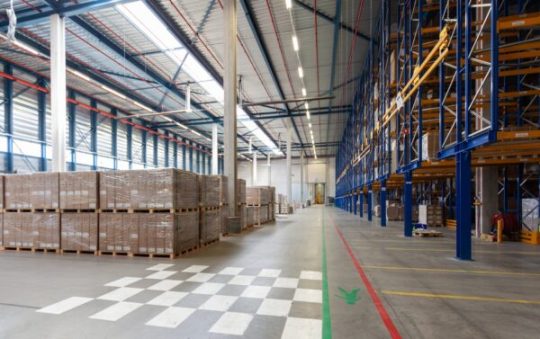
What Are Warehousing Solutions?
Warehousing solutions encompass the storage, management, and handling of goods and materials within a designated facility. These solutions may include basic storage, inventory control, order fulfillment, cross-docking, packaging, and real-time tracking systems. In India, warehousing has evolved from traditional godowns to smart, tech-enabled facilities.
Types of Warehousing Services in India
Public Warehouses: Available for general use by businesses on a rental basis.
Private Warehouses: Owned and operated by large firms for their exclusive use.
Bonded Warehouses: Licensed by the government to store imported goods until customs duties are paid.
Cold Storage Warehouses: Used for perishable goods like food, pharmaceuticals, and dairy products.
Fulfillment Centers: Special warehousing designed for e-commerce order processing and last-mile delivery.
Importance of Warehousing Solutions in India
With rising consumer demand and increasing online shopping trends, Indian businesses are investing in scalable warehousing infrastructure. Major cities like Mumbai, Delhi, Bengaluru, and Kolkata have become key warehousing hubs due to their strategic connectivity and proximity to manufacturing zones and ports.

Efficient warehousing improves:
Inventory Management: Real-time tracking and stock visibility
Order Accuracy: Automated systems to ensure timely and error-free deliveries
Cost Efficiency: Reduced transportation and storage costs
Customer Satisfaction: Faster fulfillment and returns management
Key Features of Modern Warehousing Solutions
Automation & IoT Integration: Technologies like barcode scanning, RFID, and warehouse management systems (WMS) boost accuracy and speed.
Security & Safety: CCTV, fire protection, and secure access ensure goods are stored safely.
Scalable Space: Flexible racking systems and layout designs to accommodate growing inventory.
Value-Added Services: Kitting, labeling, packaging, and reverse logistics.
Choosing the Right Warehousing Partner in India
A reliable warehousing service provider in India should offer:
Strategic locations near ports, highways, or industrial corridors
Technology-enabled systems for seamless operations
Trained staff and efficient handling practices
End-to-end logistics integration including transportation and last-mile delivery
Leading logistics providers in India offer customized warehousing solutions tailored to industry needs—whether it’s for FMCG, electronics, pharmaceuticals, or apparel.
Future of Warehousing in India
The Indian warehousing industry is expected to grow significantly, supported by government initiatives like the National Logistics Policy, Gati Shakti Plan, and expansion of logistics parks. Smart warehousing, green buildings, and AI-driven inventory systems are set to redefine the future of storage and distribution.
#WarehousingSolutions#WarehouseIndia#LogisticsIndia#StorageSolutions#InventoryManagement#SupplyChainIndia#WarehouseServices#3PLIndia#ColdStorageIndia#LogisticsSupport#B2BLogistics#IndustrialStorage#SmartWarehousing#FulfillmentCenterIndia#EcommerceLogistics#WarehouseManagementSystem#WarehouseInfrastructure#IndiaLogisticsNetwork#StorageFacilityIndia#WarehousingExperts
0 notes
Text
How Transport Management System Revolutionizes Delivery Accuracy and Customer Experience in the Middle East
The logistics landscape of the Middle East is as vibrant as the region’s fast-emerging economies. The Middle East has busy downtown areas like Dubai and Riyadh, as well as large rural spaces. This region presents unique challenges and opportunities for companies that want to deliver efficiently and accurately. In an age where speed and transparency expectations from the customer are taking off, a solid Transport Management System (TMS) is no longer an indulgence but a basic requirement for enhancing delivery precision and taking the customer experience to new heights.
The TMS Solution: Transforming Delivery Operation
A transport management system offers the cyber infrastructure to overcome these difficulties and to greatly enhance delivery precision. Here’s why:
Smart Route Optimization: Finding the shortest path is common in old systems. A modern transport management system uses real-time traffic data. It also looks at past delivery trends and driver availability. This helps create the best routes. They have unspecific addresses with advanced geocoding, so drivers can easily get to the destination. Dynamic rerouting helps the system deal with unexpected delays, like traffic or accidents. It guides drivers to a new route while keeping the delivery schedule on track.
Real-Time Visibility and Tracking: This is probably the most critical capability of delivery accuracy. A TMS offers end-to-end visibility by shipment. Dispatchers are provided with real-time location of the vehicle, driver, and delivery status on a computerized dashboard. Such preemptive monitoring enables intervention at one go in the event of deviation or delay, averting trouble ahead.
Automated Load Planning and Dispatch: Planning manually takes too much time and is human error. With a TMS, trip planning is done automatically with intelligent clustering of deliveries by destination, weight, and volume. It makes the best use of vehicles, cuts down on empty miles, and improves delivery grouping. This leads to more deliveries per shift and fewer missed attempts.
Digital Proof of Delivery (POD): Skipping paper POD, a Transport Management System allows drivers to digitally sign, capture images, and even describe failed deliveries using handheld devices. This gives immediate, precise proof of delivery, lowers contention, and simplifies billing.
Accurate deliveries are the foundation of an exceptional customer experience—crucial in today’s competitive business environment.
Proactive Communication: With real-time visibility, a Transport Management System can push automated email or SMS notifications to customers at each point of the delivery experience—from dispatch through “driver on the way” and successful delivery. This transparency gives assurance and allays fears, reducing incoming customer service calls.
Accurate ETAs: With real-time information and predictive analysis, a transport management system provides very accurate estimated times of arrival (ETAs). Customers prefer to be able to know exactly when their package will arrive so that they can better plan their day.
Self-Service Tracking: Branded customer portals allow the receiver to track their shipments themselves, eliminating the need for customer service calls for status.
Fewer Missed Deliveries: By streamlining routes and providing real-time driving directions, a TMS minimizes missed delivery attempts by removing the frustration of packages that never arrive and the hassle of rescheduling redelivery appointments.
Flexible Delivery Choices: Some advanced TMS software programs are even capable of offering customers the option of rescheduling or rerouting to a different pick-up site, providing greater convenience and control.
Middle East-Wide Benefits of TMS
How Transport Management System is adding value to Middle East Logistics
Cost Savings: The optimized routes result in lower fuel consumption. Increased efficiency provides the ability to make more deliveries using an equivalent number of vehicles, potentially minimizing the need for fleet growth. Fewer errors and conflicts also translate into fewer operating costs.
Scalability: As Middle East e-commerce continues to grow at an ever-faster rate, a cloud-based TMS can only be scaled to accommodate higher volumes of orders without incurring significant infrastructure expense.
Greater Compliance: A TMS is able to manage border problems and customs documentation and offer home regulation conformity.
Data-Driven Insights: The platform collects massive amounts of data about delivery performance, driver behavior, and route optimization. It uses this data to identify bottlenecks, improve processes even more, and make data-driven business decisions.
Conclusion
In the Middle East, the logistics industry is changing quickly. It is now important to invest in a good transport management system. This investment is essential for success. With the promise of real-time location, intelligent route optimization, and automated processes, a transport management system empowers businesses with the potential to overcome geographical challenges, significantly improve the accuracy of deliveries, and, most importantly, deliver a better customer experience. Its implementation is the window to achieving efficiency, profitability, and sustainable growth in the region’s ever-changing marketplace. https://www.instagram.com/quickmovetechnologies/
#transportmanagementsystem#freightforwarding#freight#quickmovetechnologies#warehousemanagementsystem
0 notes
Text
efficient warehouse management in the food industry a quick guide

A Warehouse Management System optimizes food industry operations by ensuring real-time inventory tracking, reducing waste, and enhancing supply chain efficiency. This guide explores key features like automated stock management, temperature monitoring, and compliance tracking. Learn how to implement a robust system to streamline warehouse processes and maintain product quality in the food industry.
#inventorymanagementsoftware#softwaredevelopment#warehouseinventorymanagementsoftware#warehousemanagement#warehousemanagementsoftware#warehousemanagementsystem
0 notes
Text
Further developed activity management occurs through inventory tracking systems joined with supply chain technology
Business proficiency requires productive inventory management to keep a consistent supply chain activity in the ongoing fast business climate. Perfect supply chain execution by means of cutting-edge tracking systems empowers organizations to make proficiency while lessening functional consumptions and fortifying consumer loyalty.
The Job of Inventory Tracking Systems
A very planned inventory tracking system empowers business administrators to see their ongoing stock status alongside following thing developments in addition to overseeing their reordering systems. High-level systems utilize blend programming components of RFID close by scanner tag examining and cloud technology to concede constant inventory tracking along these lines lessening mistakes while disposing of both stockouts and overloading circumstances. A tracking system execution empowers organizations to run their warehousing tasks all the more productively and decline misfortunes from both robbery and ill-advised management.
Headways in Supply Chain Technology
The ongoing Supply Chain Technology joins man-made reasoning with Web of Things sensors and enormous information assessment capacities to further develop business expectations as well as decisions. Organizations that use prescient examination can anticipate future interest designs which helps them close by IoT-empowered sensors that track their resources successfully. Authoritative associations execute blockchain technology all the more profoundly to accomplish better supply chain straightforwardness along with security for exchanges. Advancements achieve bound together tasks between providers who work close by warehouses and merchants.
Warehouse Management for Greatest Productivity
The warehouse management system (WMS) upgrades activities by improving how items get put away and handled toward conveyance along with strategies capabilities. Having this system empowers organizations to deal with their space better while it likewise allows them to execute robotized inventory management and settle on better conveyance choices. Warehouses get better accuracy and dexterity through supply chain and inventory tracking technology combination which guarantees both proficient conveyance management and reasonable inventory control.
Conclusion:
The mix of inventory tracking system with supply chain technology along with warehouse management empowers business activities which become more proficient with precise outcomes and extended capacities. Organizations hoping to give upper hands through current strategies difficulties ought to choose these arrangements which will set up their tasks for progress.
For original post visit: https://thepoliticus.com/further-developed-activity-management-occurs-through-inventory-tracking-systems-joined-with-supply-chain-technology/
0 notes
Text
How to Choose the Right Warehouse for Your Business Needs
Selecting the right warehouse is crucial for the success of any business, whether you’re dealing with physical goods or handling high-demand e-commerce orders. The right warehouse can streamline your operations, improve inventory management, and enhance your overall customer satisfaction. On the other hand, choosing the wrong warehouse can lead to unnecessary expenses, delays, and inefficiencies.

In this article, we’ll explore the essential factors you need to consider when selecting a warehouse that aligns with your business needs.
1. Location, Location, Location
The location of your warehouse can have a significant impact on your overall business operations, including shipping times, costs, and efficiency. A well-located warehouse reduces shipping times to your customers and allows for more cost-effective transportation.
When evaluating the location, consider factors such as:
Proximity to customers: A warehouse located closer to your customer base can result in faster delivery and lower shipping costs.
Transportation links: Ensure that the warehouse is easily accessible by road, rail, or air for quicker and more reliable shipments. A warehouse near major highways or shipping hubs can cut transportation costs.
Access to labor: Depending on the region, availability of skilled labor can be a critical factor, especially if you require specialized tasks like picking, packing, or quality control.
If you're looking for a centralized warehouse that can cater to multiple regions, choosing a location with good connectivity will be crucial for ensuring smooth operations.

2. Warehouse Size and Layout
The size and layout of your warehouse should match your storage needs. Businesses that deal with a wide variety of products, or have unpredictable inventory levels, may need more space, while others with smaller or more standardized products may require less.
Consider the following:
Available storage space: Ensure that the warehouse offers enough space to accommodate your current and future inventory needs.
Flexible storage options: Look for a warehouse that can offer scalable storage solutions to accommodate seasonal fluctuations or sudden spikes in demand. Many modern warehouses offer on-demand storage, allowing businesses to scale their space up or down depending on needs.
Efficient layout: A well-organized warehouse layout helps streamline operations and reduce inefficiencies. This includes areas for inventory reception, storage, picking, packing, and shipping. A customized layout tailored to your workflow can improve speed and accuracy.
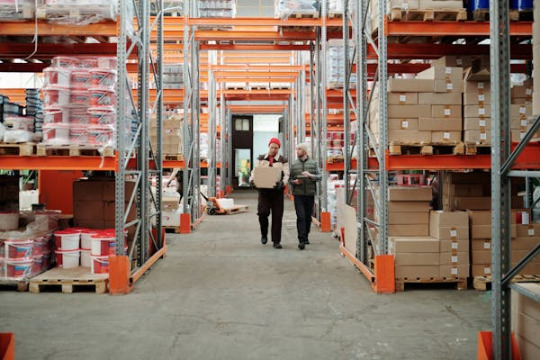
3. Technology and Inventory Management Systems
In today’s fast-paced business world, having the right technology can make or break warehouse operations. A warehouse that uses advanced inventory management systems allows you to track your products in real-time, automate processes, and maintain accurate stock levels.
When evaluating a warehouse’s technology, consider the following:
Warehouse Management System (WMS): Does the warehouse use an effective WMS? This system helps track inventory, manage orders, and optimize the storage process.
Real-time updates: Ensure that the warehouse can provide real-time data on stock levels and order fulfillment status. This helps you stay informed and make smarter business decisions.
Automation and Robotics: Some modern warehouses use automation tools like robots for picking and sorting inventory. These technologies can improve efficiency and reduce human error.
If a warehouse offers advanced technology, you’ll be able to improve your order fulfillment times and better manage your inventory, leading to higher customer satisfaction.
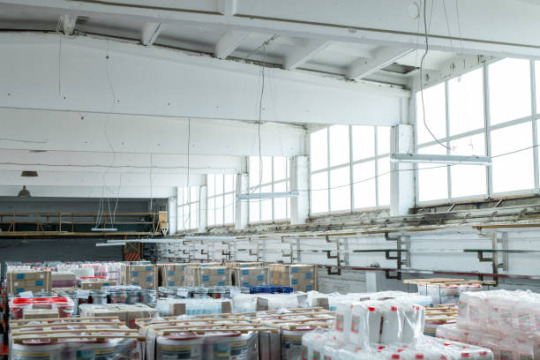
4. Security and Safety
The security of your products is paramount, especially if you’re storing high-value or sensitive items. When choosing a warehouse, make sure that it has robust security measures in place to protect your inventory from theft, damage, or loss.
Look for:
Surveillance systems: Ensure that the warehouse has comprehensive CCTV coverage and alarm systems in place.
Controlled access: Make sure that only authorized personnel have access to your storage areas. This may include security guards, access badges, or biometric authentication.
Safety protocols: Check if the warehouse adheres to safety guidelines and regulations, including fire safety, proper handling of hazardous materials, and general warehouse safety protocols.
Having a secure warehouse will protect your inventory and provide peace of mind as your business grows.
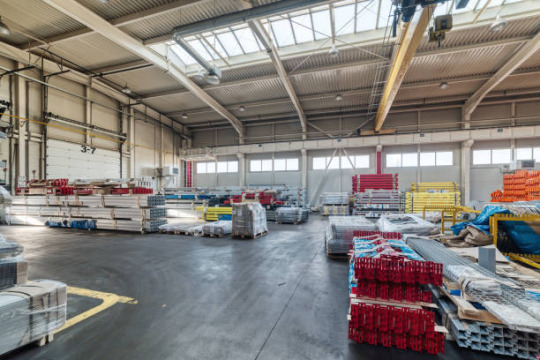
5. Cost and Flexibility
Warehousing costs can vary greatly depending on location, services, and space requirements. As a small or growing business, it’s essential to find a warehouse that fits within your budget while still providing the services and flexibility you need.
Understand pricing models: Make sure you fully understand the cost structure of the warehouse. Are you paying for a fixed amount of space, or is the cost based on how much you actually use? Many warehouses now offer on-demand warehousing solutions, allowing businesses to pay only for the space and services they need.
Hidden fees: Be aware of additional fees, such as shipping costs, handling charges, and extra services. Always factor these into your cost calculations.
Flexible contracts: A good warehouse provider should offer flexible contract terms that allow you to scale up or down depending on your business growth.
Choosing a warehouse that offers both competitive pricing and flexibility can help keep your operational costs in check.
Choosing the right warehouse is more than just about finding a place to store your goods. It’s about improving your operational efficiency, cutting costs, and supporting your overall business strategy. By carefully considering factors like location, size, technology, security, and cost, you can make an informed decision that aligns with your business goals.
When looking for cost-effective warehousing solutions or flexible storage options, make sure to choose a warehouse that fits both your current needs and future growth.
#WarehouseSelection#WarehousingSolutions#BusinessLogistics#InventoryManagement#WarehouseLocation#StorageSolutions#OperationalEfficiency#WarehouseTechnology#InventoryTracking#FlexibleStorage#WarehouseManagementSystem#SecureWarehousing#BusinessGrowth#CostEffectiveWarehousing#SupplyChainOptimization#CustomerSatisfaction#RealTimeInventory#WarehouseSafety#ScalableStorage#OrderFulfillment
0 notes
Text

Are defects and #OrderFulfillment issues holding back your #MedicalDeviceManufacturing business?
Medical devices are made from hundreds of critical components and materials. Defects in any component or process can have profound health implications and affect the company's performance.
In addition, fulfilling high-volume orders, which involves tracking the exact location, quantity, and type of finished product in a warehouse, is often marred by manual errors and fatigue. These issues can lead to a loss of sales and dissatisfied customers.
An exhaustive #Traceability and #WarehouseManagement System (#WMS) is needed, which allows us to track everything from Raw Materials to Finished Goods, including vendor-level details.
For a comprehensive traceability solution for your unit: https://zurl.co/eWv8
0 notes
Text
Discover how iProgrammer revolutionized warehouse management using AI and machine learning. Read the blog for insights, and download the full case study to learn about our tailored solutions for overcoming challenges like Real-Time Inventory Management, Theft Detection and Prevention, Enhanced Safety Monitoring.
#warehousemanagementsystem#wmssystems#warehousemanagement#bestwmssystems#bestwms#cloudbasedwms#cloudbasedwarehousemanagementsystem#cloudwms#warehousemanagementsolution
0 notes
Text
Simplify Business Operations with a Warehouse Management System

A Warehouse Management System (WMS) plays a vital role in ensuring the smooth operation of warehouses by automating and optimising various processes. It allows businesses to manage inventory levels efficiently, track stock movements in real-time, and enhance order fulfilment accuracy. By leveraging a WMS, companies can reduce operational costs, improve inventory visibility, and streamline the picking and packing process, ultimately leading to faster delivery times.
ILS (Indian Logistics Services) offers integration connecting businesses with various courier partners, each equipped with their own specialised Warehouse Management Systems. This means that ILS clients can enjoy the benefits of advanced warehouse management without the need for a separate solution. By partnering with ILS, businesses can ensure that their inventory is handled efficiently across multiple platforms, enabling seamless logistics operations.
Embrace the power of integration with ILS and take your warehouse management to the next level! Let us help you enhance your logistics strategy while optimising your warehouse operations through our extensive courier partner network.
0 notes
Text
Warehouse Management System - Unicommerce

Unicommerce's Warehouse Management System (WMS) is designed to revolutionize how warehouses operate by streamlining processes from receiving goods to dispatching packages. This cloud-based SaaS platform supports over 8,300 warehouses and 2,900 stores, showcasing its scalability and adaptability. Unlike basic warehouse management software, Unicommerce’s WMS offers advanced features like automated stock-level management, location allocation, and purchase management. This comprehensive solution integrates seamlessly with logistics partners, providing real-time tracking and routing of shipments. With its focus on optimizing inventory visibility and enhancing operational efficiency, Unicommerce’s WMS ensures that businesses can manage their resources smartly and meet the dynamic needs of the retail and e-commerce sectors. By utilizing advanced technology, this system helps in reducing errors, improving productivity, and ensuring timely order fulfillment, making it an indispensable tool for modern warehouse operations.
0 notes
Text
Optimizing Multi-Location Inventory and Warehouse Management with ERP Solutions

This blog delves into the complexities of managing inventory and warehouses across multiple locations as businesses expand. It highlights how Enterprise Resource Planning (ERP) systems are integral to streamlining these processes, offering real-time inventory tracking, advanced analytics, and seamless coordination. Key features such as Warehouse Management System (WMS) integration and multi-location management are discussed, showcasing how ERP systems improve efficiency, reduce costs, and enhance customer service. The blog also covers the implementation process, best practices, and the importance of technology in scaling operations efficiently.
It seems like you're asking for a contact suggestion or information. Could you please clarify what kind of contact or details you're looking for? phone no:+91 90004 82706 +91 9573737308 Email:[email protected] Website: https://accnu.in/multi-location-inventory-and-warehouse-management/
#accnu#accnuERP#ERP#ERPPartner#ERPProvider#ERPSolutions#ERPSystem#EnterpriseResourcePlanning#WareHouseManagementSystem#InventoryManagement#CustomerServices#WarehouseManagement#improveefficiency#reducecosts#enhancecustomerservice#MultiLocation#DigitalTransformation#erpservices#besterppartner#besterpprovider#besterpsolutionprovider
0 notes
Text
Accurate inventory management ensures that you can meet customer demands, minimize excess stock, and avoid costly disruptions. One of the biggest advantages of Customized ERP software is its ability to centralize data.
The ability to quickly access detailed reports also aids in auditing and performance analysis. ERP system simplifies communication with suppliers and vendors, ensuring timely deliveries and reducing lead times. Contact us today to learn how our solutions can help you achieve greater control, accuracy, and efficiency in your operations.
#ERPSystem#InventoryManagementSoftware#ERPSoftware#CustomizedERPSoftware#StockManagementSoftware#ProductionERPSoftware#WarehouseManagementSystem#SoftwareForInventorManagement#InventoryManagementSoftwareIndia#LeanManufacturingSystem
0 notes
Text
Optimize Your Warehouse Operations with Advanced WMS
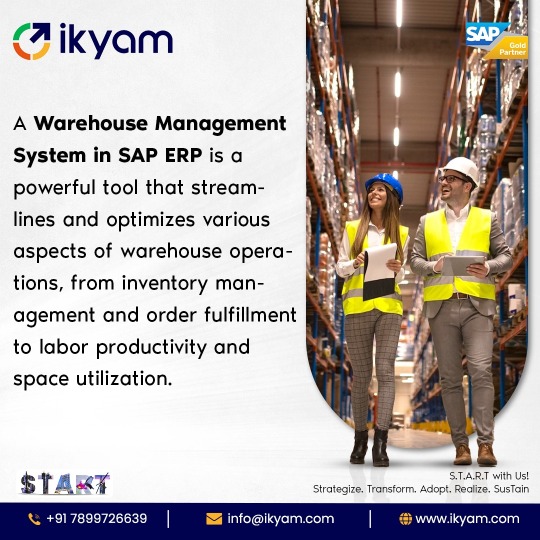
A Warehouse Management System (WMS) is a powerful tool that streamlines and optimizes various aspects of warehouse operations. From inventory management and order fulfillment to labor productivity and space utilization, a WMS enhances efficiency, reduces errors, and boosts overall productivity. Implementing a robust WMS solution can transform your warehouse into a seamless, well-organized, and highly efficient operation.
About Ikyam Solutions Ikyam Solutions is a leading provider of innovative and tailored ERP and WMS solutions, dedicated to helping businesses achieve operational excellence. With a strong focus on delivering value through technology, Ikyam Solutions offers a comprehensive range of services designed to optimize your warehouse operations and drive business growth. Partner with Ikyam Solutions to unlock the full potential of your warehouse with cutting-edge WMS solutions.
With years of industry experience, Ikyam Solutions understands the unique challenges faced by warehouses and distribution centers. Our team of experts works closely with clients to design and implement WMS solutions that are customized to meet specific business needs. From initial consultation and system design to implementation, training, and ongoing support, Ikyam Solutions ensures a seamless transition and continuous improvement.
At Ikyam Solutions, we are committed to helping you achieve a competitive edge through enhanced warehouse efficiency and productivity. Our state-of-the-art WMS technology integrates seamlessly with your existing systems, providing real-time visibility and control over your entire warehouse operations. Whether you are looking to streamline inventory management, improve order accuracy, or maximize space utilization, Ikyam Solutions has the expertise and solutions to help you succeed.
Experience the benefits of a well-implemented WMS and take your warehouse operations to the next level with Ikyam Solutions. Contact us today to learn more about how our WMS solutions can transform your business.
For More Details Contact Us: Phone: +91 7899726639 Email: [email protected] Website: https://ikyam.com/
#Ikyam#ikyamsolutions#SAP#SAPServices#SAPSolutions#SAPPartner#SAPprovider#ERP#ERPpartner#ERPProvider#ERPsolutions#ERPServices#WareHouse#WareHouseOperations#WarehouseManagementSystem#WMS#WMSsolutions#InventoryManagement#WarehouseEfficiency#OrderFullillment#Warehousetechnology#WMSIntegration#WarehouseSolutions
0 notes
Text

Selecting the right warehouse management system (WMS) is crucial for the success of your business. Consider key factors like scalability, integration, user-friendliness, cost, and customer support to ensure you choose a system that meets your needs and supports your growth. Discover how each factor impacts your operations and helps you make an informed decision.
0 notes